cargoshortsenjoyer
12K posts
Adult. go to my sideblog, @wereallsaloonaticshere (Eddsworld), or my other sideblog, @candy-induced-vertigo (Wordgirl)/ header is by @Sushi~Kuso. Howdy! (Formerly fanboysstillexsist )
Don't wanna be here? Send us removal request.
Text
wish I could talk about concerns with certain ultraprocessed food without feeling like i'm rfk or something. I just think it's weird companies make garbage food that tastes so bad they have to add copious amounts of sugar so it tastes good. I was watching this interview with some execs & one of them is like "it's crazy, the cereal tastes like metal before this process" Awesome man. I love capitalism. we have advanced food science and we use it to make people less healthy for money. I say "certain ultraprocessed food" because it's not that food processing is inherently of the devil--you can process food in a way that adds nutrients rather than removes them or make foods more suitable for people with certain disabilities to consume--but the overwhelming majority of companies just keep fucking up everyone's colon like wtf. it's also interesting to see how food processing is used in products marketed for dieting. I buy these ultraprocessed protein bars that taste amazing but if I have more than two in a day my stomach explodes because they put SUCH a high concentration of certain nutrients in this one small thing that you can't consume it casually. pisses me off, i'm telling you. but you can't say this without feeling like you're an antivax mom orsomething
358 notes
·
View notes
Text


I didn’t like how this drawing was going so you can have it. for free. This is the only place I will post my fucked up drawings. welcome to my beautiful world.
104 notes
·
View notes
Text
BOTCHED COUP D'ETAT LEADER YOON SUK YEOL HAS BEEN IMPEACHED CONSTITUTIONALLY AND UNANIMOUSLY, AND THE DECISION IS FINAL!!!!!🥹🥹🥹🥹🎉🎉🎉🎉🎉🎉🎉🎉🎉🎉🎉🎉


WE DID IT!!! WE KOREANS DID IT!!! PLEASE SPREAD THE WORDS!!! I WANT ALL INTERNATIONAL COMMUNITIES TO KNOW THAT WE DID IT🥹🥹🥹🥹🥹🥹🥹🥹🥹🥹🥹🥹🥹🥹🥹🥹🥹🥹🩵💙🩵💙🩵💙🩵💙🩵💙🩵🩵💙🩵💙🩵🩵🩵🩵🩵🩵🩵💙💙💙💙💙💙💙💛💛💛💛💛💙🩵💛💛💛💛
I'm nearly in tears. All the mental and physical pain and suffering that me and other Koreans have gone through waiting for his ousting has finally been paid off.
It was NEVER easy. I can't believe how many obstacles there actually were to come to this conclusion. Yoon and his cronies, his ruling far-right conservative party, and their blind supporters never gave up till the last minute. They took numerous cards in their sleeves to prevent this glorious day from happening.
Still, such is life. Life is full of chaos. Humans are just chaotic. Some are unbelievably great, while some others are just downright scumbag. That's just how it is. All we need to do is never give up going forward. 🥹🥹🥹🥹🥹🥹🥹🥹🥹🥹🥹🥹🥹🥹
5K notes
·
View notes
Text


-> READ LARVIE & LIBRO HERE <-
@decafbat and I drew FIFTY-SIX PAGES of improvised insanity, all hosted on its own site, viewable above ! we'll continue to add to it, as long as we have fun doing so ( ⍩ )
It gets sporadically violent & nsfw, so 🔞!
2K notes
·
View notes
Text
Hey Dakas and Dakinis,
I'm sorry I know it's the same thing every single day but I had to for real leave today, I have no idea where I'm going now/where I'm going to spend the night and it's looking like I'll be sleeping rough on the street
There's a trailer park around that I found out about yesterday, they're awful but might let me stay if I can produce $1,000 cash.
If not I was gonna go to Kmart and get some basics (sleeping bag, thick socks, battery packs for chafing devices) which would be like $200 (same $200 I've been trying to raise all week)
I'm so scared I can barely type, please help me if you can 😭


0/200 (camping gear goal)
0/1000 (rent a room at a trailer park goal)
Thank u so much 🩷🩷🩷
116 notes
·
View notes
Text

friendship ended with dexdark. now todexdark. dexbeydark. dexdarkbey. is my best friend
33 notes
·
View notes
Text

It was too difficult to choose just one 🪻
84 notes
·
View notes
Text

This is literally not true but repeated constantly online. It's literally the same line of thinking as "trauma makes you gay" like it just doesn't work like that 😭
2K notes
·
View notes
Text
For those of us who don't want to ever have kids/don't have kids yet but still want to be able to be a positive presence in kids' lives, there's an article that I think is worth reading: Interact with Minors - Devon Price. It describes how engaging with minors as an adult is not fundamentally sexual or inappropriate, and that when you treat minors like they are inherently stupid, embarrassing, and generally dangerous for you to be around, you do yourself and primarily them an extreme disservice. It focuses a lot on the online aspect of this--It takes a strong stance against adults with "DNI minors" in their bios, for instance--Price argues that more online interactions with adults are much, much better than less. Adults who seek to harm children will always be online and in real life, and if the adults who would otherwise be kind, understanding, patient, and interested in the child/teen (if the adults in question didn't believe that interacting with minors would immediately put their name in a google doc somewhere) are nowhere to be found, baring the minor from even the most mild of chit chat, the young person will only find companionship and advice from the adults who seek to harm them, to take advantage of their oppressed status as children. Don't just plan to give your own kids respect at some vague point in the future; do it NOW!
(The article itself is much more interesting and eloquent than the description of it I just gave, and it's pretty short--try it out!)
I need to remind people of something very important, okay? I need you to listen to what I have to say and read it through even if your instinctual reaction is uncomfortable.
Minors are not these pure little things you think of them as. Teenagers are going to have sex whether or not you're okay with it. Kids are going to find a way to do the stupid thing. It doesn't matter how tight of a leash you keep on them. It's not inherently the fault of the people they hang out with either.
I need you to recognize these things and provide safe outlets and accomodations for the minors in your life. If you're a parent, the sex talk is CRUCIAL, especially for consent. From a young age you should be having age appropriate discussions about consent. For a toddler it can be as simple as telling them it's okay to not want a hug and then respecting that boundary. By the time they're old enough to know what sex is, they should be able to have that conversation with a peer and explain to that peer what consent means so that they can have a level discussion.
You also need to provide things like condoms in the case that they become sexually active. Hell, you can just keep a box under the bathroom sink and check it periodically to make sure they're not expired or gone. If the teen doesn't use it for themselves, they'll give it to a friend to keep them safe.
For the stupid stuff, it doesn't matter the age, they're going to do stupid things. The 3 year old will eat the dirt, the 8 year old will skip out on the helmet, the 13 year old is gonna play a game you don't approve of, the older teen is going to partake in activities you don't want them doing. You can provide them safe outlets to prevent the more dangerous things. If they feel safe at home they'll feel comfortable telling you about the kid who tried to get them to vape. If they have access to a physical outlet they be able to express their emotions in a healthy physical way. This can be as simple as you bringing them to the high school or college track on the weekends so they can run, giving them the privacy to put on a stupid video with stupid music they can dance it out to without judgement, or even just inviting them to go on a short walk with you while dinner is cooking. Good outlets can reduce reckless behavior significantly. This is especially good for the teens that just got the legal ability to drive.
Also, one thing I cannot stress enough is to not revoke their access to the safe accommodations and outlets. I don't give a freezedried fuck how in trouble they may be with you or with the school or even the law. If they are legally allowed to access the places they use as outlets they need to be able to go. You can just take away possibly the only coping mechanism that works for them.
Please just give minors a chance to exist without your judgement or preconceived notions of how they're meant to exist. Not everyone is the same. Not everyone is going to be this perfect little angel. You have to work with what you have and accept them for who they are and how they are.
6K notes
·
View notes
Photo
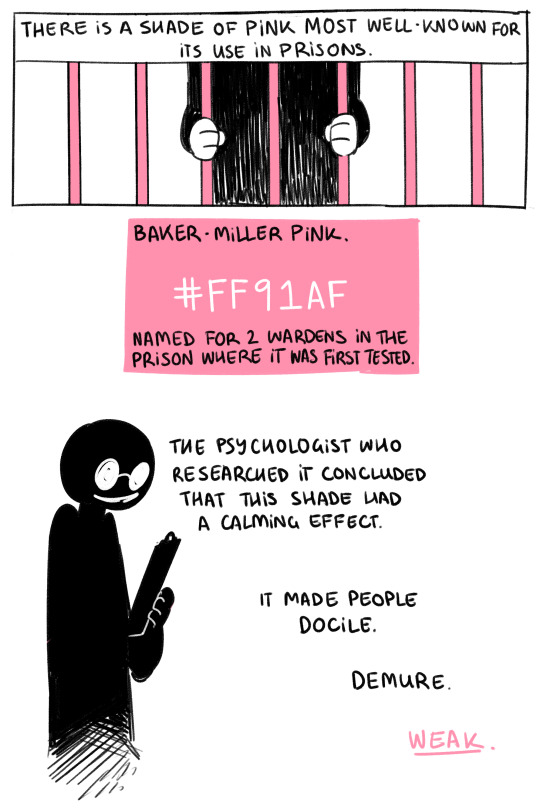
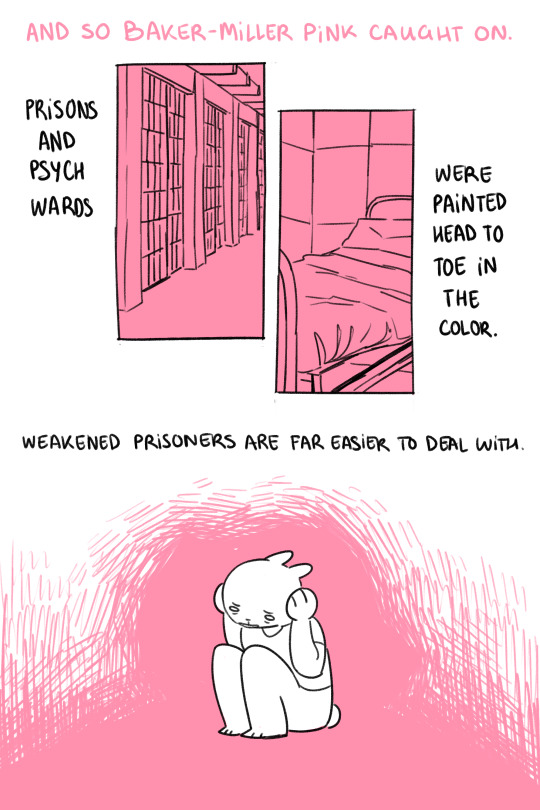
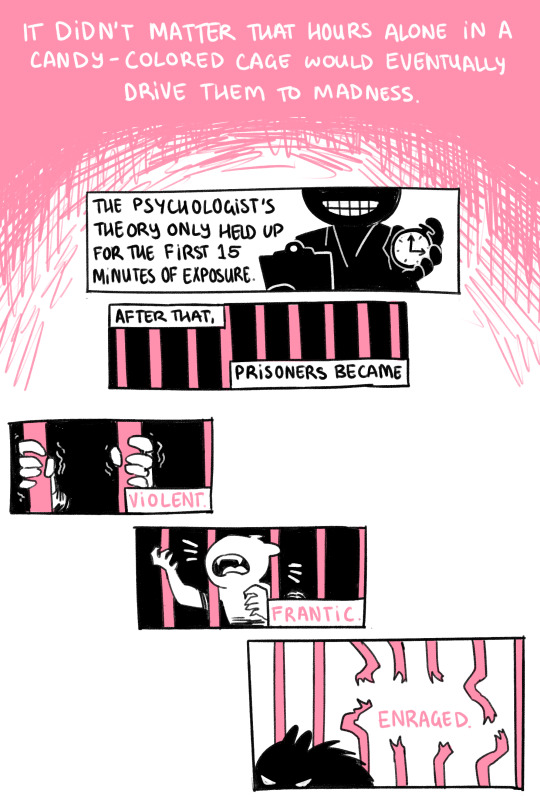
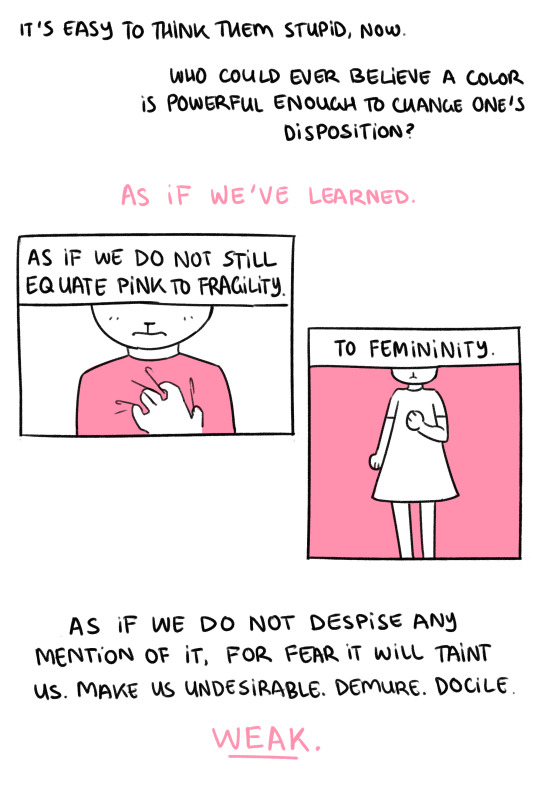
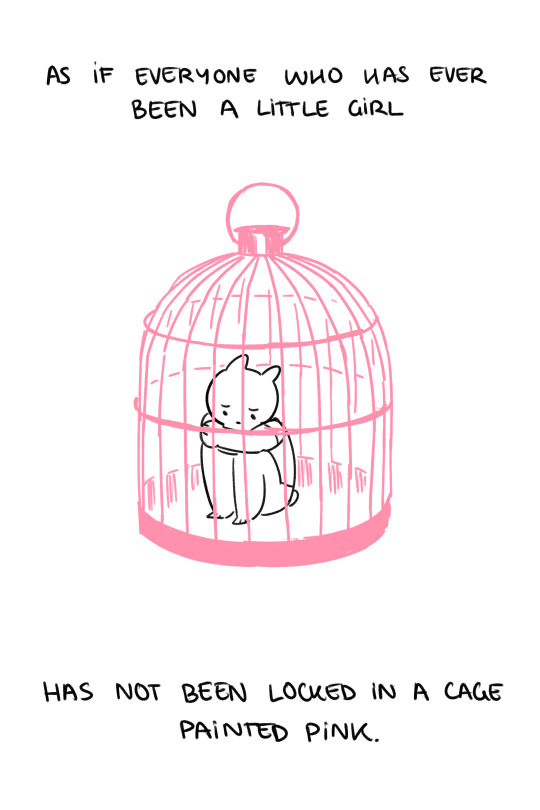
Pink Prison, a comic I did for my color theory class this semester! we had to pick a color, research it, and do a piece related to it somehow. i chose pink :)
113K notes
·
View notes
Text

#I think ron desantis should kill himself#everyone no matter their age or citizenship status deserves to have fair labor laws to protect them!!#people are going to start moving their families out of florida if this happens. then what? make the elderly in nursing homes work in fields
7K notes
·
View notes
Text
I saw a post that said, "do people know of any yuri manga thats appropriate for 16 year olds", asking for their kid. Like...I'm sorry but they're already an older teenager. If whatever they're reading is too intense or too much for them, they know that they can put the book down. If theres sexual things/sex in the book...well, I don't think that's bad either. Why is it seen as inherently harmful for a teenager to read porn? This poster is extremely progressive...it sucks to see someone think that sex/misc. adult topics should be totally off limits to teenagers, even just in a fictional story.
0 notes
Text
Hello, where have you been, man or woman? I wanted to tell you that you are now reading this post, either at work, on your break, or with your family, having a good time. I don’t know, but what I want you to know is that I am now writing this post after I was (forced) to flee. Focus on my words. I was forced, under the intensity of the aerial and artillery bombardment, to flee from my home to another place. Why? (Just to search for safety). Imagine, just to stay safe. This will not end here, and I am also suffering from a lack of food and water. This is our life. It is truly difficult. What I am going through cannot be described, but rather lived. I mean in my words that no matter how much I write, say, document, or take videos and photos, it will not be enough to describe our situation. Therefore, my friend, I ask you to donate to me if you can, and if you cannot, and I truly appreciate everyone’s circumstances, just share. Maybe someone else who has the ability to donate will see this post and donate, so please donate.
5K notes
·
View notes



